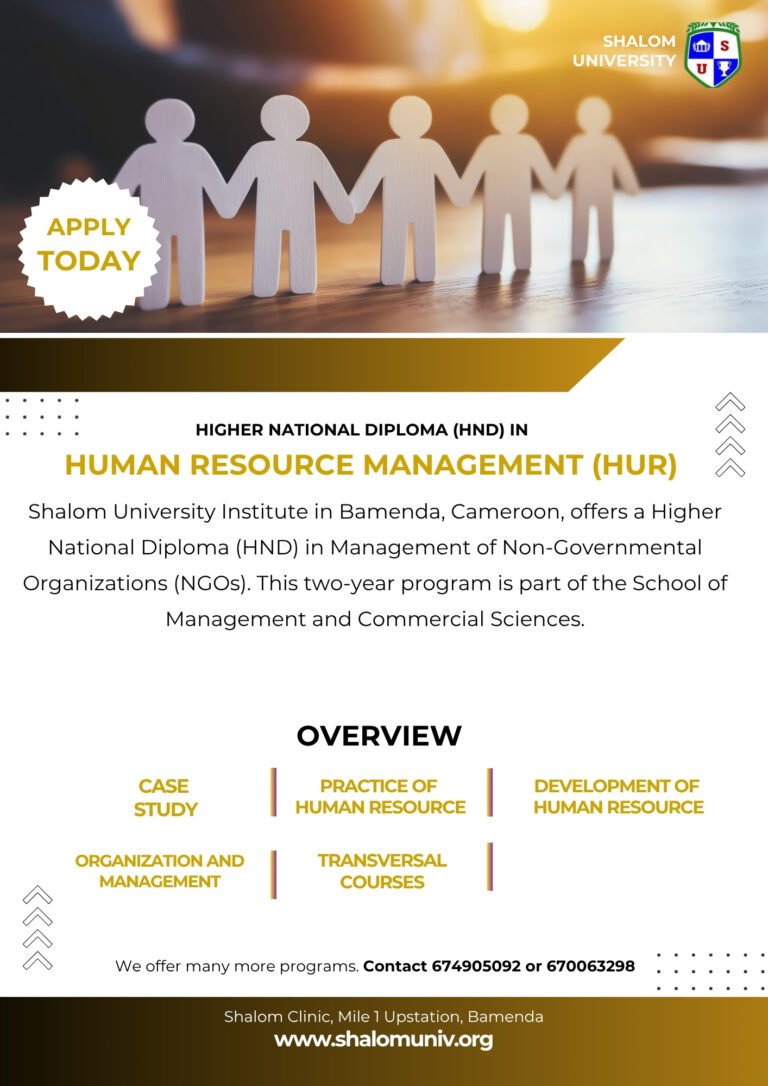In Cameroon’s increasingly competitive markets, both local and international, the consistent delivery of high-quality products and services is not merely an advantage; it’s a necessity. Organizations across sectors, from manufacturing and healthcare to services and agriculture, are recognizing that effective quality management is fundamental to customer satisfaction, operational efficiency, and long-term sustainability. The HND in Quality Management (QMA) at Shalom University in Bamenda is designed to cultivate professionals who can spearhead these vital quality initiatives.
The program at Shalom University is tailored to equip students with the principles, methodologies, and practical skills needed to implement robust quality management systems. It addresses the unique challenges and opportunities within the Cameroonian business and regulatory environment, preparing graduates to drive continuous improvement and achieve excellence in diverse organizational settings.
The QMA Curriculum at Shalom University
The HND in Quality Management program at Shalom University is structured around a set of core papers that provide a comprehensive and practical education in the field.
Paper: Case Study
The Case Study paper is a vital component that integrates all the theoretical knowledge and technical skills gained throughout the program. It challenges students to analyze complex quality-related scenarios, from addressing customer complaints to improving production processes. This is particularly relevant for quality managers in Cameroon, who must often work within specific local regulations, limited resources, and diverse operational contexts.
The course trains students to:
- Analyze real-world quality challenges: Based on a given case, students must evaluate quality control issues, process inefficiencies, or non-compliance incidents faced by an organization in Cameroon.
- Identify root causes and impacts: They pinpoint specific problems related to product defects, service failures, or system deficiencies and assess their impact on customer satisfaction, costs, and reputation.
- Propose evidence-based solutions: Students formulate practical recommendations based on quality management principles, process optimization techniques, and relevant standards. For example, a case study might involve a food processing company facing contamination issues, requiring a proposal for improved hygiene protocols, traceability systems, and staff training relevant to local production methods.
- Defend their decisions: During formal presentations, students must justify their analysis and proposed solutions, demonstrating their critical thinking and communication skills, which are essential for driving quality culture within an organization.
Paper: Optimisation and Accounting
This paper highlights the crucial link between quality management, operational efficiency, and financial performance. Effective quality management is not just about meeting standards; it’s also about reducing waste, improving processes, and ultimately impacting the bottom line. This integrated approach is essential for quality managers in Cameroon, where resource optimization can be critical for business survival and growth.
Key areas of focus include:
- Process Optimisation Techniques: Methods for analyzing and improving business processes to eliminate waste, reduce cycle times, and enhance efficiency (e.g., Lean principles).
- Cost of Quality: Understanding the financial implications of quality, including the costs of prevention, appraisal, internal failure, and external failure.
- Performance Measurement: Developing and utilizing key performance indicators (KPIs) to track quality performance and identify areas for improvement.
- Financial Accounting for Quality Decisions: Using accounting data to make informed decisions about quality investments, cost reductions, and return on quality initiatives.
Paper: Organizational Planning
Effective quality management requires strategic planning and integration within the broader organizational structure and objectives. This paper provides students with the knowledge of how to plan, organize, and lead quality initiatives that are aligned with the organization’s mission and vision.
The curriculum covers:
- Strategic Quality Planning: Developing a quality strategy that supports the overall business strategy.
- Organizational Structures: Understanding how different organizational structures can support or hinder quality initiatives.
- Leadership and Culture: The role of leadership in fostering a culture of quality and continuous improvement.
- Change Management: Strategies for implementing quality-related changes within an organization and gaining employee buy-in.
- Project Planning for Quality Initiatives: Applying project management principles to plan and execute specific quality improvement projects.
Paper: Practical Aspects of Quality Management
This paper is the hands-on component of the program, providing students with the essential tools, techniques, and practical skills needed to implement and manage quality systems. It focuses on the day-to-day responsibilities and tasks of a quality professional.
Key areas of focus include:
- Quality Management Systems (QMS): Principles and implementation of internationally recognized QMS standards (e.g., ISO 9001), crucial for Cameroonian companies aiming for international markets.
- Statistical Process Control (SPC): Using statistical tools to monitor and control production processes, ensuring consistent quality.
- Quality Tools and Techniques: Practical application of various quality tools such as flowcharts, fishbone diagrams, Pareto charts, and control charts.
- Auditing and Compliance: Conducting internal and external audits to assess compliance with quality standards and regulations.
- Continuous Improvement Methodologies: Implementing methodologies like Six Sigma or Total Quality Management (TQM) to drive ongoing improvements in processes and products.
Driving Excellence in Cameroon
Graduates of the HND in Quality Management from Shalom University are well-prepared to enter the workforce in various roles across Cameroon’s diverse sectors. They can serve as Quality Control Officers, Quality Assurance Specialists, Process Improvement Analysts, or contribute to management teams in manufacturing, services, healthcare, and other industries. Their proficiency in quality system implementation, process optimization, and data analysis, coupled with a strategic understanding of organizational planning, makes them invaluable assets to any organization striving for excellence. The Case Study paper ensures that they are not just technically skilled but also adept at applying their knowledge to solve real-world quality challenges and drive continuous improvement. By providing a practical and contextually relevant education, Shalom University plays a significant role in nurturing the quality expertise crucial for building competitive and sustainable businesses in Cameroon.




